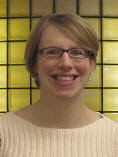
So I obviously have a lot to say on this topic-based on my background as a librarian. I enjoy searching and figuring out library databases and search engines--scary, huh.
Databases I use for my own research:
- Academic Search Premier
- Library Literature
- ERIC
- Library Information Science and Technology Abstracts
Some of my strategies with keywords include:
- Brainstorming a few keywords
- Looking at results and then gathering more keywords for searching
- Narrowing my results to around 200 results
- Limit my search so it searches the Title or Abstract
- Changing the "sort by" to relevance
I tend to use the Web to do preliminary or informal research--when I am just looking for some information and don't need to spend much time evaluating the quality.
Categories of Feeds I subscribe to:
-Journals (to get tables of contents)
-News from professional organizations
-Blogs of experts (Librarians) in the field (I tend to get them from conferences I go to)
-Blogs of technology
Ways to improve students information literacy skills:
- Be specific as you write assignments (e.g use Academic Search Premier to find two articles on x topic)
- Have student collect some article then pick a couple of the best and explain why--then do additional searching based on those articles
- Have students reflect on the research process (e.g. what database did you use, what keywords did you use)
- Bring a media specialist or librarian for a few sessions to help teach students tips and techniques for doing research--often they can be involved in a few steps such as picking and narrowing a topic, finding websites and articles and with evaluating
- Read up on the Big6 (http://www.big6.com/) for teaching information literacy for K12 or the Association for College and Research Libraries Information Literacy Standards for Higher Education (http://www.ala.org/ala/acrl/acrlissues/acrlinfolit/infolitoverview/...)





2 comments:
Your entry was a joy to read from the point of view of scientific and technical communication: very clear, lots of lists, and not text heavy at all. It is obvious from the very beginning that you are an expert in the field of information search, hence my questions. First of all, would you recommend using the U of M Library’s OneSearch? I noticed it was not on your list. What about Google Scholar? Which search engine/database would you recommend to a Ph.D. student from the Rhetoric and Scientific and Technical Communication program interested in dictionaries of science and technology?
Regarding your strategies with keywords, I keep forgetting about the “sort by” option; thanks for the tip!
Good questions:
-OneSearch: I tend to not use OneSearch--probably a professional bias because this technology-called "federated search" doesn't allow for as much advanced searching. I am willing to search multiple databases and use search techniques to increase precision versus searching one database and having to view lots of false results. I think it is really personal preference.
--I think Google Scholar is a good tool but I think to think about it along with some of the library database not instead of.
--Searching in your discipline is challenging as it is very interdisciplinary. Which is one reason that OneSearch and Google Scholar are useful tools as they are more interdisciplinary.
I would recommend searching both the communication databases for theory and background and the science databases for examples and application.
I have been working on building the subject page for Communication, Scientific and Technical: http://www.lib.umn.edu/site/rqs.phtml?subject_id=36 with some useful databases--let me know if you have questions or any additions.
Post a Comment